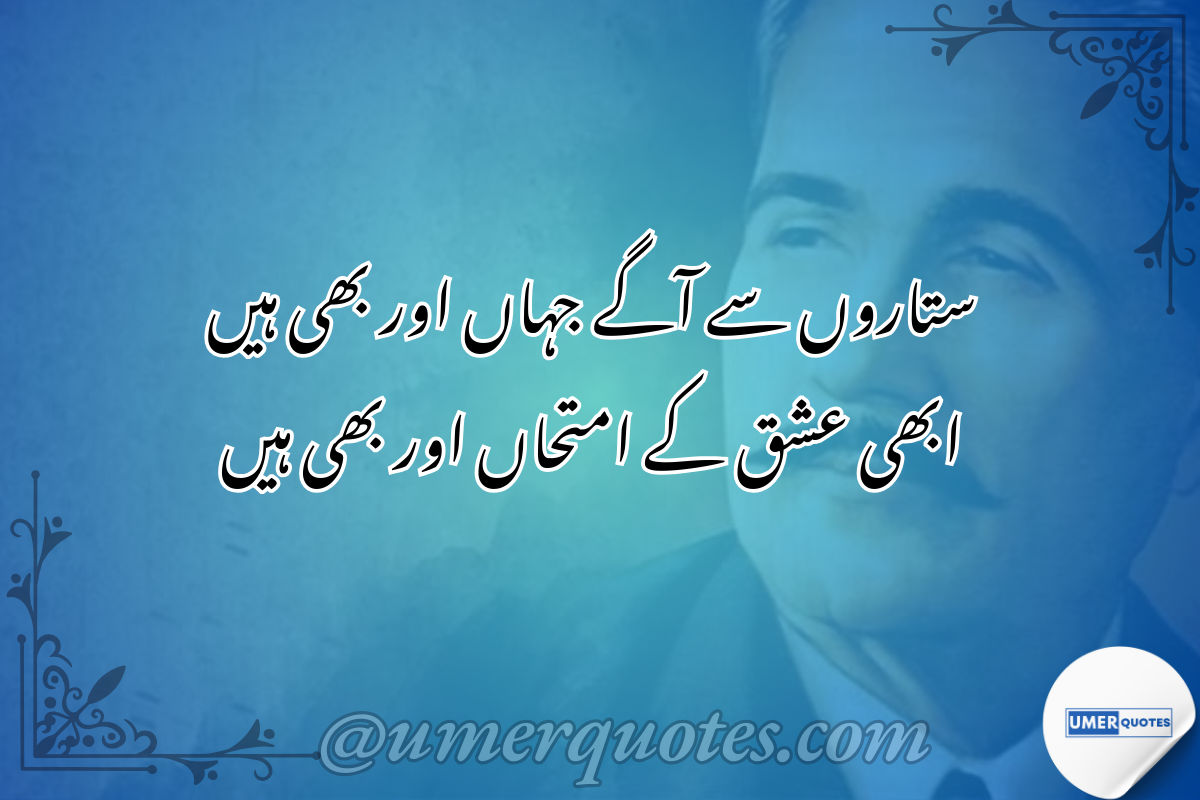
ستاروں سے آگے جہاں اور بھی ہیں
ابھی عشق کے امتحاں اور بھی ہیں
These are among the famous poems of Allama Iqbal that express his lofty thinking, self-discipline, and belief in the unlimited potential of man. Let us explain these verses in detail:
Beyond the stars there are others:
- This verse points to a wide range of possibilities.
- The poet says that there is no limit to human progress. The stars, which are generally considered as the height and limit of the sky, for Iqbal is not a final destination but a world beyond.
- This stanza invites man not to consider his abilities limited and emphasizes that there is still much to discover in the universe.
There are still more tests of love:
- Love here is not just romantic love but a symbol of higher purpose and struggle.
- The poet reminds man that the journey of life is not easy. Love means sacrifice, hard work, and constant striving for self-improvement.
- The mention of test in this stanza indicates that a person has to go through the trials of his feelings and intentions in order to reach the heights.
Message:
Through these poems, Iqbal teaches us courage and courage. They say that man’s goals are limitless, and the secrets of the universe are yet to be discovered. By describing love as the source of success and evolution, he highlights that this passion not only keeps man active but also forms the basis of his spiritual and practical development.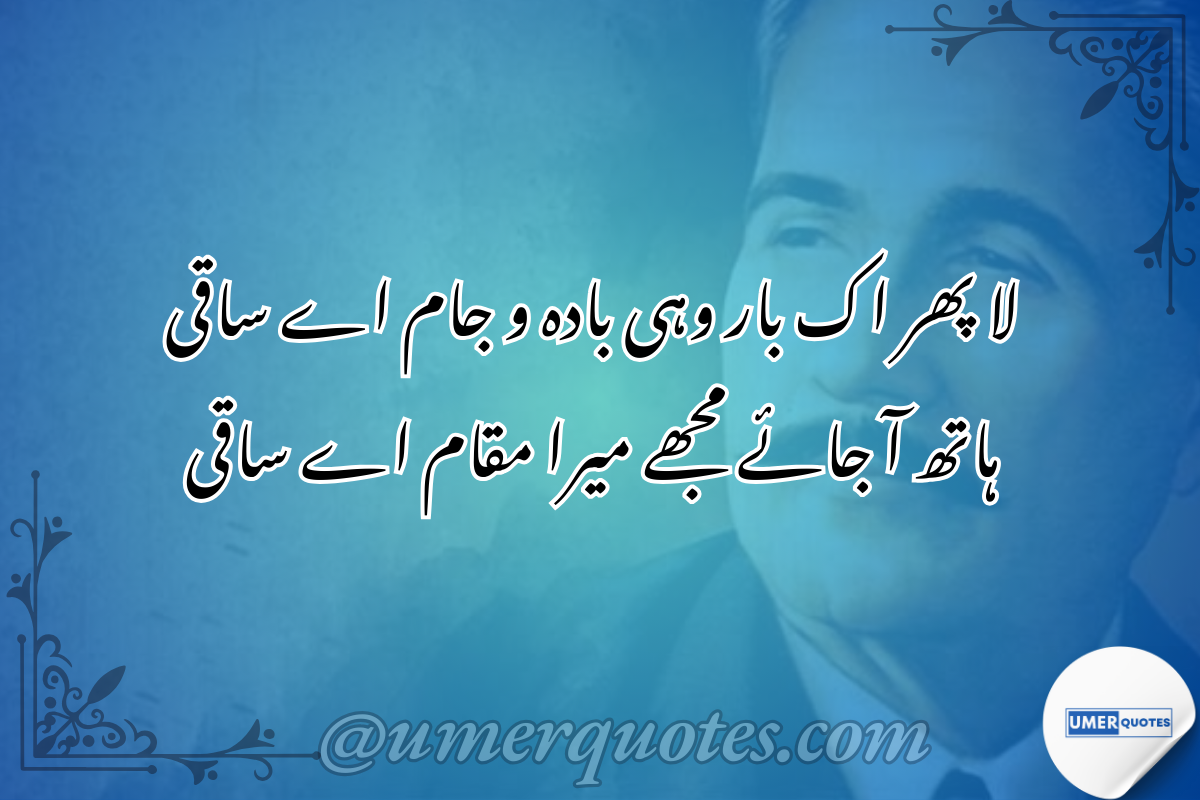
لا پھر اک بار وہی بادہ و جام اے ساقی
ہاتھ آ جائے مجھے میرا مقام اے ساقی
Iqbal here is using “badah wa jam” figuratively, which indicates spiritual awakening and depth of consciousness. They pray that they will be blessed with the same spiritual energy and knowledge again, which will give them awareness of their true position and purpose of life.
Once again, the same wind and jam, O butler:
- Bada wa jam here is not in the traditional sense of drinking, but a sign of spiritual excitement, passion, and passion.
- The poet pleads with the “Saki” to restore him to the state that once led him to spiritual awakening and elevation.
- This stanza is an expression of a wish that the poet regains his lost inner strength and intuition so that he can go further in the journey of life.
My hand should come to me, O butler:
- “Place” here does not mean mere material status or fame, but a higher spiritual and intellectual destination, which the poet considers to be his original reach or destination.
- The poet believes that if he regains his inner strength and passion, he will nurture his greatness and purpose.
- This stanza describes the quest for self-discovery and the deep desire to realize one’s true self.
Message:
These poems depict the journey of man in search of his true reality and higher destiny. The poet teaches us that from time to time in life we need to look within ourselves again and restore our lost energy. These verses invite that man should recognize his own self and seek to achieve his position through it.
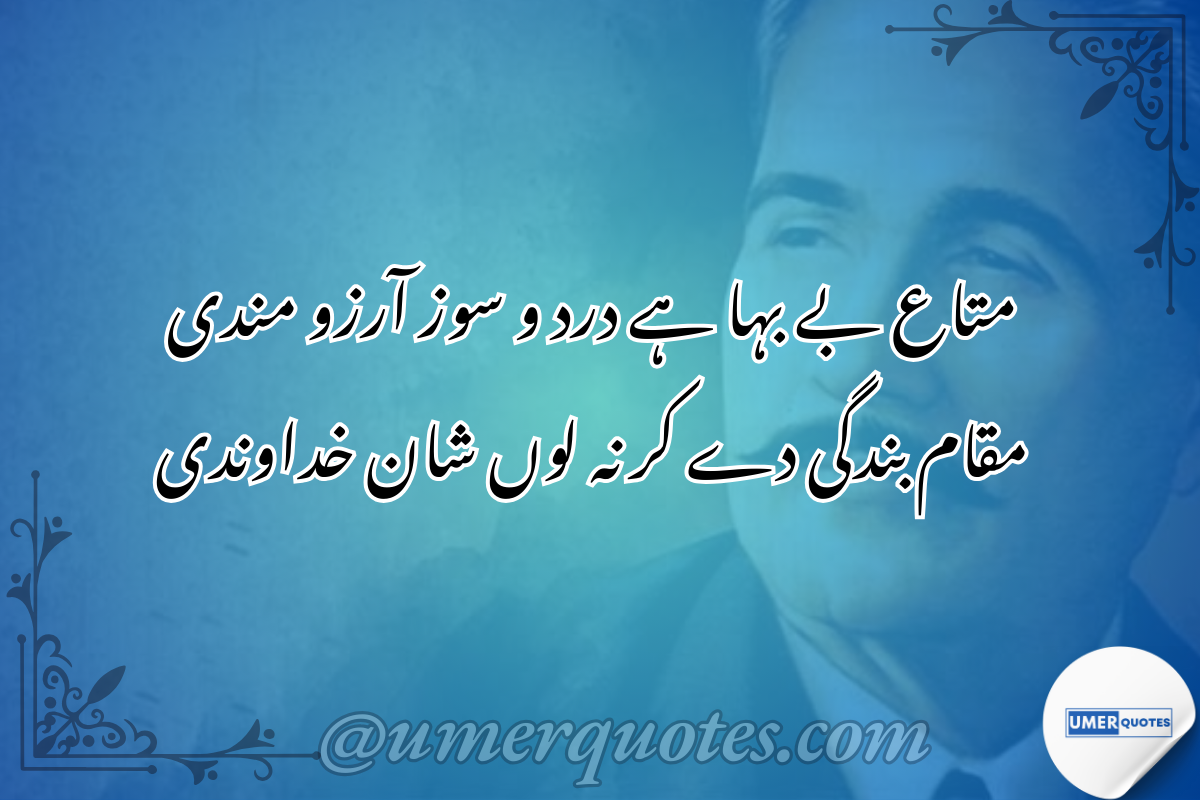
متاع بے بہا ہے درد و سوز آرزو مندی
مقام بندگی دے کر نہ لوں شان خداوندی
Allama Iqbal’s poetry which is included in his book “Baal-i Jibreel”. In this poem, Iqbal describes his philosophy of self and servitude in a very beautiful way. Iqbal states here that “pain and desire desire” means burning desire and desire is a precious pleasure for man.
Pleasure is in vain, pain and longing:
- Mata Bayabaha: This is the precious treasure that cannot be bought at any price. Here the poet describes “pain” and “swelling” as a rare and valuable asset.
- Aching Desire: The yearning of longing and desire creates the passion and purpose of living within man. This urge moves a person out of stagnation and motivates him to reach new heights.
- The poet emphasizes that this intensity of pain and desire is man’s greatest wealth, for it leads him to creation, toil, and perfection.
Do not take the glory of God by giving the position of servitude:
- Position of servitude: Here the poet describes servitude as the greatest honor and position of a human being.
- The glory of God: The glory and majesty of God, which is infinite and beyond human understanding.
- The poet says that he would never want to exchange his position of servitude, humility, and apostasy with the glory of God, because servitude is the true reality and position of man.
- This verse highlights the relationship of man with the Creator, where the servant considers his humility and subservience as his greatness and considers God’s person to be higher than everything else.
Message:
Through these poems, Iqbal makes man realize his reality and greatness.He asserts that pain and longing are the source of human progress, and that servitude is man’s greatest honor. God’s glory is infinite, and the servant’s task is to bow before that glory and make his servitude his place.
Here are more of his poetry
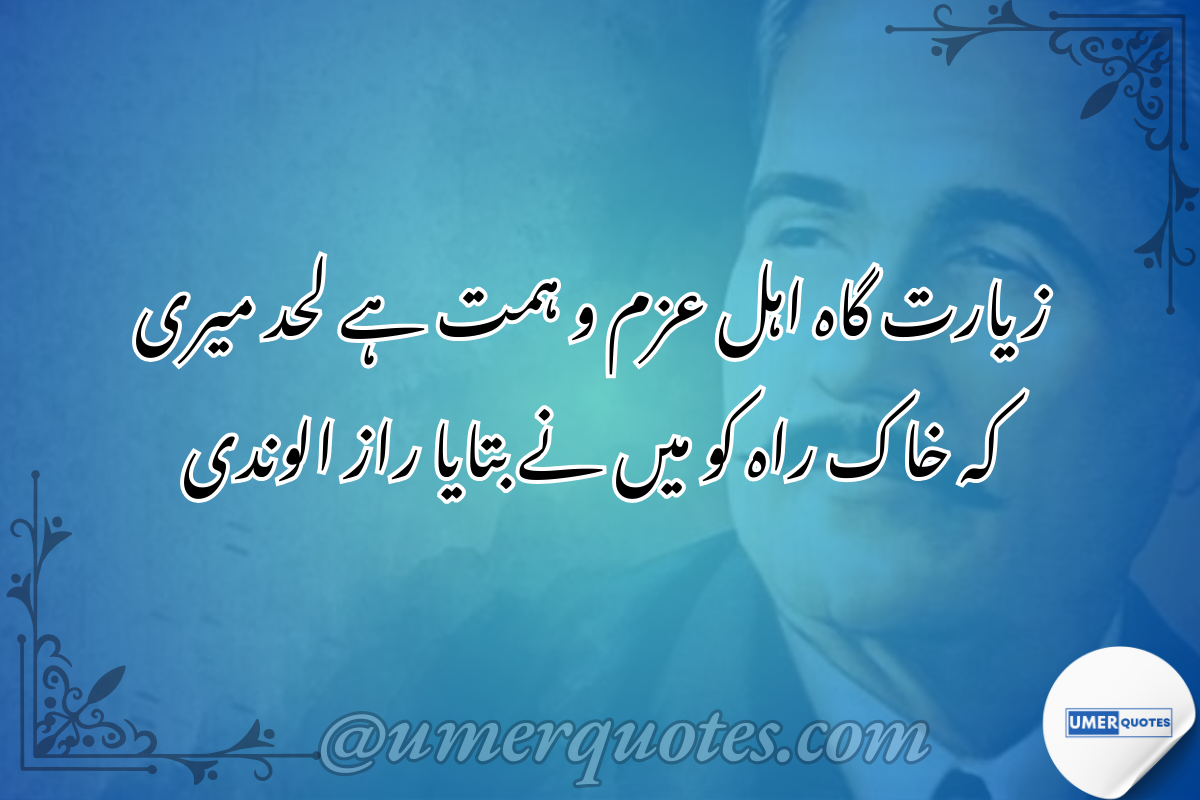
زیارت گاہ اہل عزم و ہمت ہے لحد میری
کہ خاک راہ کو میں نے بتایا راز الوندی
This poem is a deep philosophical expression of Allama Iqbal’s poetry, which is included in his book “Baal-e-Gabriel”. Let us analyze this poem in detail: Iqbal here is describing his Lahad (tomb) as a place of pilgrimage for those who have determination and courage.
The place of pilgrimage is a place of determination and courage:
- Ziyarat Gah: A place where people come with devotion and respect. Here the poet is describing his grave (Lahad) as a place of pilgrimage for the people of determination and courage.
- People of determination and courage: People who possess high morale, courage, and strong will.
- The poets describe that his life’s struggle and sacrifices will be so great that his grave will become a beacon for those who want to live with courage and courage.
- This stanza expresses man’s desire to fill his life with deeds that will be a source of inspiration to others, even after death.
That I told Khak Raah as a secret:
- khak rah: the dust or dirt of the road, which is generally regarded as worthless.
- Secrets of Alwandi: “Alwandi” refers to the secrets of heights or greatness.
- The poet says that by the action of his life, he taught the secrets of greatness even to this dust, which was apparently worthless, but his efforts also raised him to a high position.
- This stanza highlights the philosophy of struggle and selfhood, where the poet believes that even the most trivial and worthless thing can be elevated to the highest position to achieve greatness.
Message:
These poems inspire a person for high goals and great struggles in life. Poets say that the impact of a great person’s life remains even after death and becomes a beacon for others. The true greatness of man lies in the fact that he takes even the trivial and worthless things to the highest level by his struggle and determination.
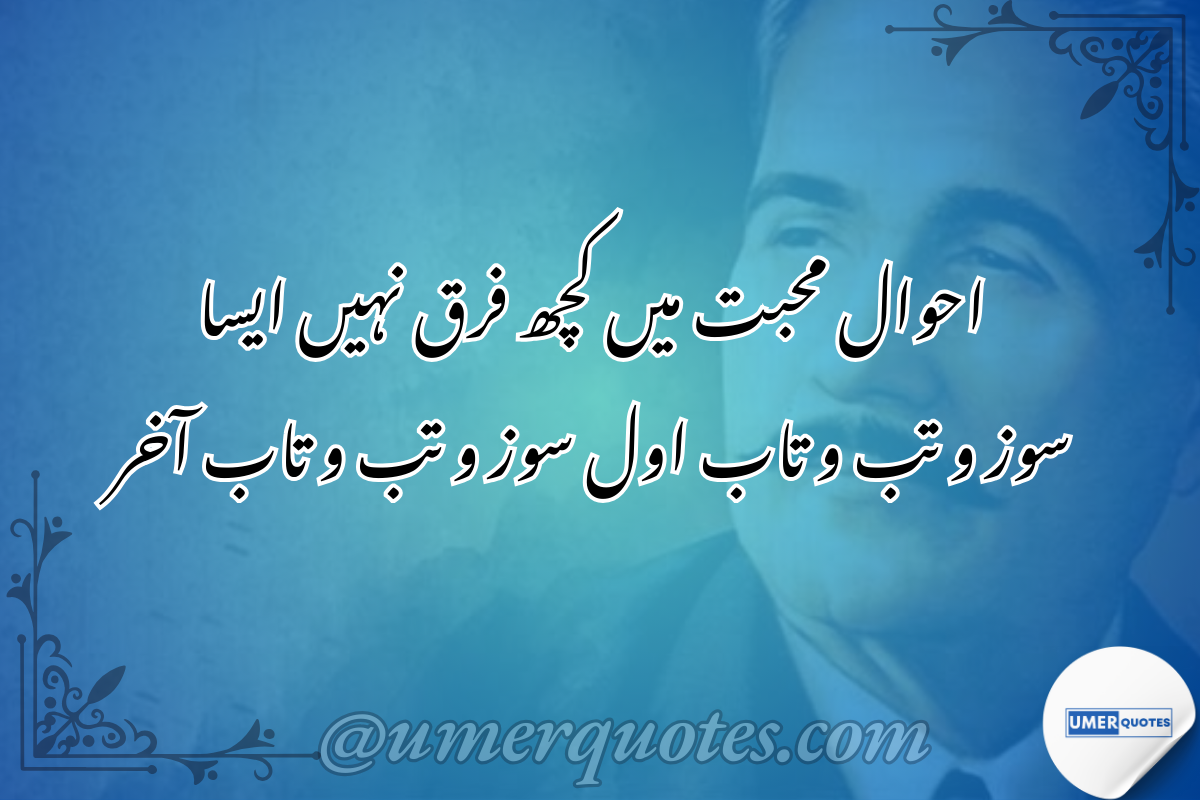
احوال محبت میں کچھ فرق نہیں ایسا
سوز و تب و تاب اول سوز و تب و تاب آخر
Allama Iqbal is saying that the state of love is the same at the beginning and at the end.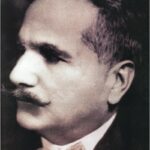 Whether love begins or ends, its intensity and emotions do not matter. He explains that the emotions that burn in the beginning, longing and love, are the same emotions in the end. Living up to love is always the same in its intensity.
Whether love begins or ends, its intensity and emotions do not matter. He explains that the emotions that burn in the beginning, longing and love, are the same emotions in the end. Living up to love is always the same in its intensity.
There is no difference in love
- Afwal Love: Situations and conditions of love, which describe the emotions and feelings that pass through the lover’s heart and mind.
- The poets are saying that there is no significant difference in the experiences and conditions of love, whether it is the beginning or the end of love.
- Love is a force that remains constant, its intensity and depth do not diminish with time or circumstances.
Swelling and burning first, burning and burning last
- Soz: A yearning for love and an inner burning, which makes the lover restless.
- Then: The condition that shows the passion and passion of love, i.e. the warmth of the lover’s heart.
- Passion: The energy and movement created by the passion of love, which keeps the lover constantly moving.
- The poets describe here that the pain and excitement of love in the beginning, the same pain and excitement remain till its end.
- This verse describes the constant and unwavering nature of love which remains the same in all circumstances
Message:
The reality of love is not affected by time, circumstances, or endings. The beginning and the end of love have the same emotional intensity, because love has permanence and immortality. The longing and passion of love remains the same, no matter the stage.
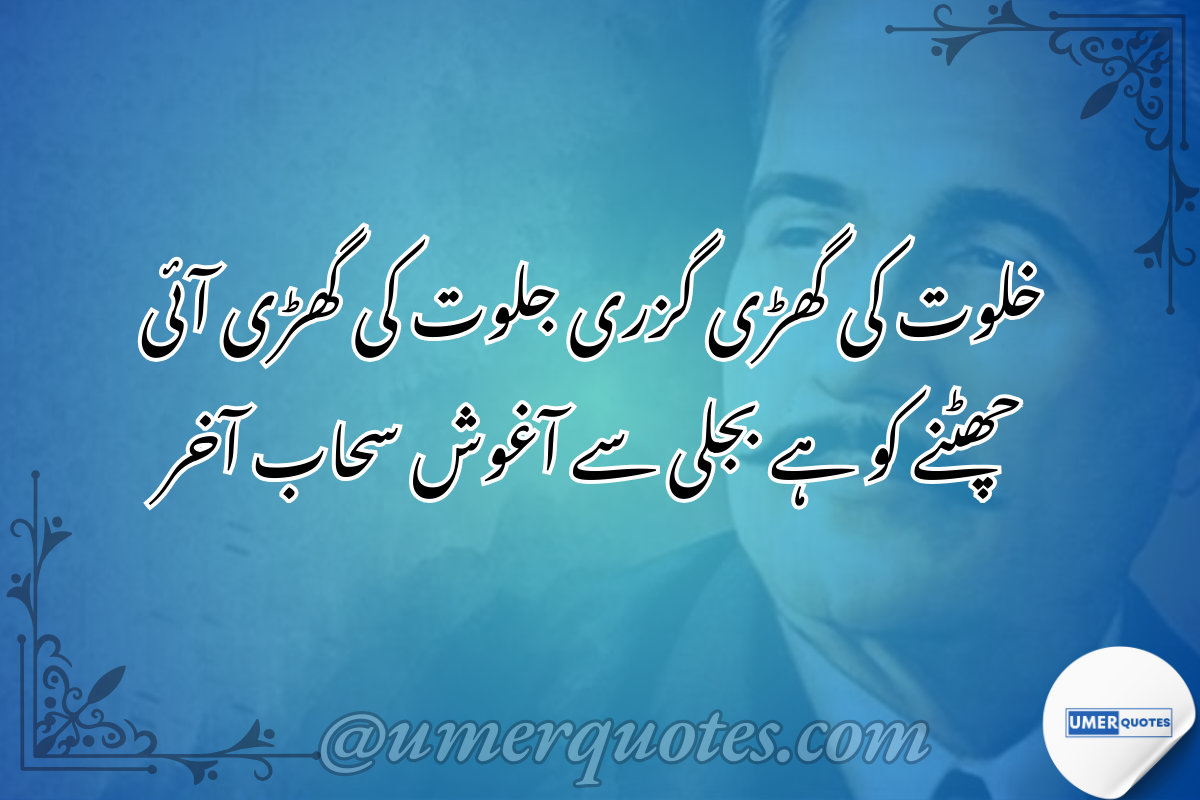
خلوت کی گھڑی گزری جلوت کی گھڑی آئی
چھٹنے کو ہے بجلی سے آغوش سحاب آخر
In this poem, the poet points out that at one time a person or a nation has to prepare its inner self (Khulot), but then the time comes when these abilities have to be used in practical life (Jalut). It encourages the initiation of an action and the manifestation of hidden power.
The hour of silence has passed, the hour of excitement has come:
- Solitude: Solitude, which is a time of peace, contemplation, and spiritual meditation.
- Jalut: The time of gathering or being among people, representing the world of action and appearance.
- Here the poet is talking about different stages of life. The clock of Khulot symbolizes man’s inner journey and self-discovery, while the clock of Jalut shows his action, struggle, and worldly character.
Finally, the cloud of lightning is about to be released:
- Lightning: Symbolizes light, energy, and force of action.
- Aghus Sahab: The lap of clouds, which symbolizes peace, security, and silence.The poet here combines a natural scene with the emotions and experiences of human life.
- The electricity (force) hidden in the bosom of the clouds is now about to be released, that is, the energy that was hidden, is now about to manifest and exert its influence on the world.
- This stanza shows a great change and intensity of action, where the inner force is ready to come out.
Message:
This poem describes the relationship between the different stages of life and the spiritual and practical worlds. Khulut (solitude) is the time of inner peace and self-recognition of man, while Jalut (party) is the expression of his practical life. Lightning emerging from the lap of the clouds is a sign that the time has come to reveal hidden energy and potential.




